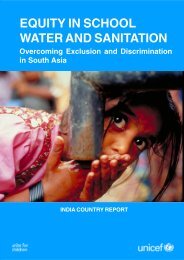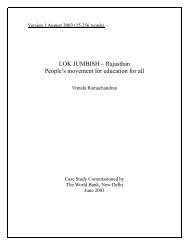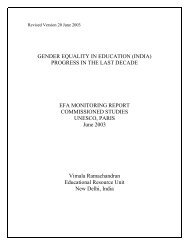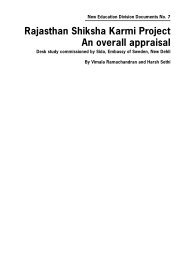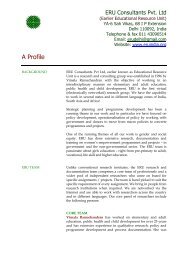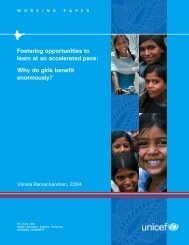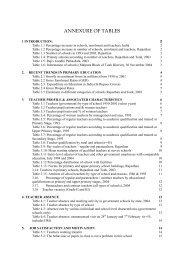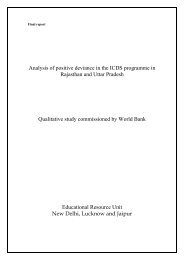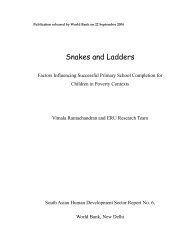primary school teachers the twists and turns of everyday practice
primary school teachers the twists and turns of everyday practice
primary school teachers the twists and turns of everyday practice
You also want an ePaper? Increase the reach of your titles
YUMPU automatically turns print PDFs into web optimized ePapers that Google loves.
Version 20 Oct 08, edited final<br />
<strong>of</strong> posts. Teachers we spoke to in <strong>the</strong>se two states said that this was a huge<br />
motivator. Incidentally, we also met <strong>of</strong>ficials in SSA who had started <strong>the</strong>ir careers as<br />
<strong>primary</strong> <strong>school</strong> <strong>teachers</strong>.<br />
When <strong>the</strong> Shiksha Karmi Project was initiated <strong>the</strong> idea was to enable rural youth to<br />
gradually upgrade <strong>the</strong>ir educational qualifications <strong>and</strong> <strong>the</strong>reby become ‘regular’<br />
<strong>teachers</strong> at some point <strong>of</strong> time. Recently (2007) <strong>the</strong> Orissa government has proposed<br />
that those who enter as para-<strong>teachers</strong>/contract <strong>teachers</strong> should, over <strong>the</strong> years, move<br />
up to become regular <strong>teachers</strong>. Interestingly <strong>the</strong> World Bank is also proposing a<br />
similar regime, whereby a teacher could first be hired as an apprentice <strong>and</strong> <strong>the</strong>n<br />
move up to become an associate teacher (based on performance <strong>and</strong> educational<br />
status) <strong>and</strong> finally a ‘master’, meaning a regular teacher. This approach also argues<br />
for checks <strong>and</strong> balances in <strong>the</strong> tasks <strong>of</strong> hiring, posting/assignment, training, salary,<br />
supervision <strong>and</strong> dismissal—<strong>the</strong>reby ‘balance(ing) local control with higher-level<br />
support for training, pr<strong>of</strong>essional st<strong>and</strong>ards <strong>and</strong> monitoring’ (Pritchett <strong>and</strong> Pance<br />
2006).<br />
Do we have a chance?<br />
For far too long educationists <strong>and</strong> researchers have only analysed <strong>and</strong> pointed out<br />
what is wrong <strong>and</strong> how terrible <strong>the</strong> system is. The time has come to develop clear<br />
plans—maybe state-specific plans—for educational reform. There is a need to bring<br />
toge<strong>the</strong>r like-minded people <strong>and</strong> those with experience in both <strong>the</strong> education sector<br />
as well as in management to develop concrete alternatives, put <strong>the</strong>m out into <strong>the</strong><br />
public domain <strong>and</strong> talk to people who care. Momentous changes like <strong>the</strong> Right to<br />
Information or <strong>the</strong> National Rural Employment Guarantee Act (NREGA)<br />
programme did not happen because someone in government had a bright idea. They<br />
came about because a group <strong>of</strong> people decided to work towards <strong>the</strong>m.<br />
74



